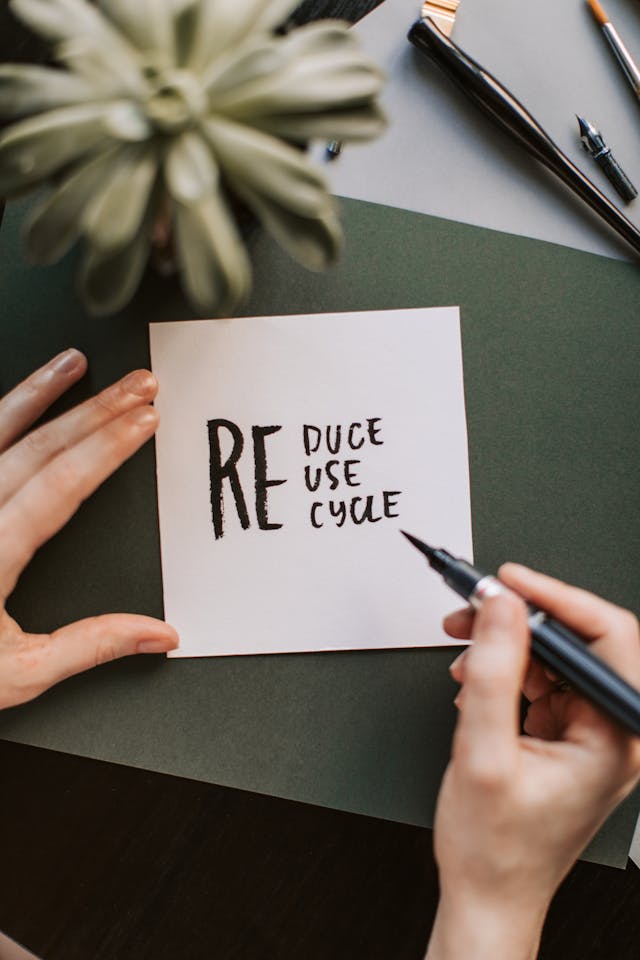In a world where consumption is rampant and waste is abundant, the concept of zero-waste living has emerged as a beacon of hope for a more sustainable future. Rooted in the philosophy of reducing, reusing, and recycling, zero-waste living challenges us to minimize our environmental footprint and live in harmony with the planet.
Article Sponsor: Parking Lot Striping Columbus
In this article, we embark on a journey into the world of zero-waste living, exploring its principles, benefits, and practical tips for embracing this eco-conscious lifestyle.
Understanding Zero-Waste Living: Redefining Consumption
At its core, zero-waste living is about reevaluating our relationship with the material world. It involves minimizing the generation of waste by making conscious choices at every stage of consumption. From the products we purchase to the way we dispose of them, every decision we make has the potential to either contribute to or mitigate waste.
The Principles of Zero Waste: Refuse, Reduce, Reuse, Recycle, Rot
Zero waste is guided by five key principles:
- Refuse: The first step in reducing waste is to refuse what we don’t need. This includes single-use plastics, unnecessary packaging, and disposable items.
- Reduce: Minimize consumption by opting for products with minimal packaging, buying only what you need, and avoiding overconsumption.
- Reuse: Embrace reusability by choosing products that can be used multiple times, such as refillable water bottles, cloth shopping bags, and durable containers.
- Recycle: Properly recycle materials that cannot be refused, reduced, or reused. Sort and separate recyclables according to local guidelines to ensure they are processed correctly.
- Rot: Compost organic waste to divert it from landfills and return nutrients to the soil. Food scraps, yard waste, and other biodegradable materials can be composted to create nutrient-rich soil for gardening.

Benefits of Zero-Waste Living: Environmental and Personal
Embracing a zero-waste lifestyle offers a myriad of benefits, both for the environment and for individuals:
- Reduced Environmental Impact: By minimizing waste generation, zero-waste living conserves natural resources, reduces pollution, and mitigates the harmful effects of landfilling and incineration.
- Cost Savings: Adopting a zero-waste lifestyle often leads to cost savings by prioritizing conscious consumption and eliminating the need for disposable items.
- Healthier Living: Zero-waste living encourages the use of natural, non-toxic products, resulting in healthier homes and communities.
- Sense of Purpose: Living in alignment with environmental values can foster a sense of purpose and fulfillment, knowing that your actions are making a positive impact on the planet.
Practical Tips for Zero-Waste Living: Small Changes, Big Impact
Transitioning to a zero-waste lifestyle may seem daunting at first, but it’s all about taking small, manageable steps. Here are some practical tips to help you embark on your journey towards zero waste:
- Audit Your Waste: Start by assessing your current waste habits. Keep track of the items you throw away and identify areas where you can make improvements.
- Reduce Single-Use Plastics: Swap out single-use plastics for reusable alternatives. Invest in stainless steel straws, bamboo utensils, and beeswax wraps to reduce plastic waste.
- Shop Mindfully: Bring reusable bags and containers when shopping to avoid plastic packaging. Choose products in bulk to minimize packaging waste and support businesses that offer sustainable options.
- Embrace DIY: Explore DIY alternatives for common household items, such as cleaning products, personal care items, and snacks. Making your own products not only reduces waste but also allows you to customize them to your preferences.
- Compost Organic Waste: Set up a composting system for food scraps, yard waste, and other organic materials. Composting not only diverts waste from landfills but also creates nutrient-rich soil for gardening.
- Choose Quality Over Quantity: Invest in high-quality, durable products that are built to last. While they may have a higher upfront cost, they often save money in the long run and reduce the need for frequent replacements.
- Practice Mindful Consumption: Before making a purchase, ask yourself if you truly need the item and consider its environmental impact. Opt for second-hand items whenever possible and support businesses that prioritize sustainability.
- Educate and Advocate: Share your journey towards zero waste with others and inspire them to make positive changes in their own lives. Advocate for policies and initiatives that support waste reduction and environmental conservation in your community.

A Sustainable Future Starts with You
Embracing a zero-waste lifestyle is not just about reducing the amount of waste we produce; it’s about reimagining our relationship with the planet and living in harmony with nature. By making conscious choices in our daily lives, we can minimize our environmental footprint and create a healthier, more sustainable world for future generations. Waste not, want not—it’s a simple mantra that holds the key to a brighter future for all. Join the movement towards zero waste and be a part of the solution to the environmental challenges we face today.
Thank you for visiting our blog! We hope you are finding some really good information while here. If you have any comments or questions be sure to contact us today. We also ask that you visit our sponsor Columbus Parking Lot Striping.